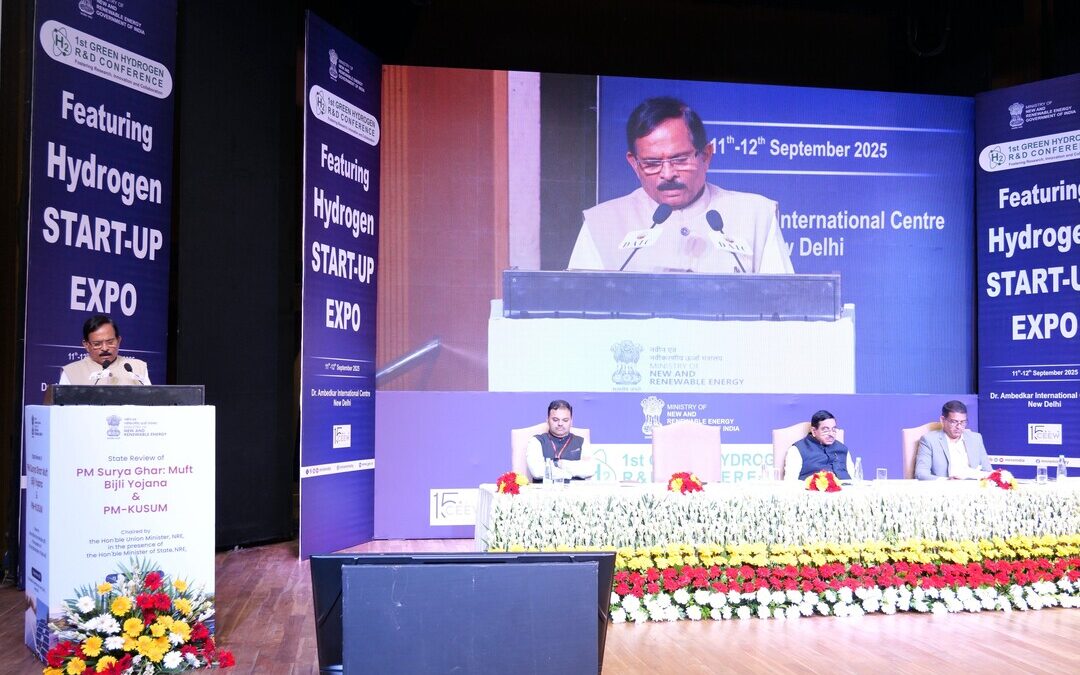India Pushes to Become Global Hub for Green Hydrogen Innovation
India ramps up green hydrogen R&D to boost clean energy, startups and global competitiveness under its Net Zero 2070 mission.
India aims to position itself as a global hub for green hydrogen innovation as it accelerates efforts to meet its 2070 net-zero target, Union Minister of State for New and Renewable Energy Shripad Yesso Naik said on Friday.
Naik was addressing the closing session of the first Green Hydrogen R&D Conference in New Delhi, organized under the National Green Hydrogen Mission, where he urged scientists, startups and industry to collaborate to make India a green hydrogen powerhouse.
Green Hydrogen Central to Net Zero
“Green hydrogen will decarbonize our hardest-to-abate sectors, open new trade frontiers, and create a cleaner and more secure future,” Naik said, adding that the fuel will play a critical role in India’s path to net zero by 2070.
The National Green Hydrogen Mission, launched last year, aims to make India not only a consumer but also a global hub for innovation and manufacturing of hydrogen technologies.
Expanding R&D and Startup Ecosystem
The Ministry of New and Renewable Energy has supported more than 200 R&D projects in renewable energy, hydrogen, fuel cells and storage technologies, according to the government.
Dedicated funding, testing facilities and incubation programs have been created to support innovators. During the conference, a call for proposals for hydrogen startups was launched to fast-track innovation and reduce entry barriers.
“Our laboratories must become launchpads and our startups global champions,” Naik said, encouraging young researchers to design disruptive solutions instead of incremental ones.
Two Days of Deliberations
The two-day conference drew more than 1,300 participants and featured 17 technical sessions, including five panel discussions and eight roundtable meetings, officials said.
Discussions covered electrolysis, thermochemical and biological production pathways, storage and transport challenges and fuel-cell applications.
Governance frameworks, commercialization, safety, infrastructure and talent development were also highlighted as key areas for scaling hydrogen technologies.
Sessions also explored long-term “blue-sky” research alongside near-term applications, while roundtables addressed safety standards and testing infrastructure to build trust in green hydrogen technologies.
Economic Growth and Industrial Competitiveness
Naik stressed that green hydrogen was not just an energy project, but also an economic opportunity, with the potential to power the steel, cement, fertilizer, mobility, and shipping sectors, reduce import dependence, and create high-value jobs.
“At a time when countries are designing cross-border carbon regulations, India’s leadership in green hydrogen will ensure our industries remain competitive and future-ready,” he said.
Industry and Institutional Support
Mission Director of the National Green Hydrogen Mission, Abhay Bhakre, said over 140 standards have already been published to support sector growth. At the same time, the National Institute of Solar Energy pledged to strengthen partnerships and mentoring for startups.
Akash Tripathi, head of the Solar Energy Corporation of India, said India has an opportunity to rapidly advance in electrolyzer manufacturing and hydrogen technologies, but emphasized the need for robust mentoring systems alongside funding.
Nirmal Menon
Related posts
Subscribe
Error: Contact form not found.


